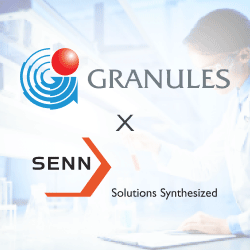Overview of chiral synthesis (enantioselective synthesis) for the manufacturing of chiral intermediates & APIs and CMOs offering such services.
Q1. What is Chiral Synthesis?
Chiral synthesis is the synthesis of a compound by a method that favors the formation of a specific enantiomer or diastereomer. Chiral synthesis is also known as enantioselective synthesis and asymmetric synthesis. Enantio-selective synthesis provides access to biologically active small molecules within the pharmaceutical industry.
In recent years, chiral molecules have gained a lot of attention from the pharmaceutical industry in its search for new and more selective active pharmaceutical ingredients. Enantioselective synthesis is an important process in modern chemistry. It is very important in pharmaceuticals, as the different enantiomers or diastereomers of a molecule often have different biological activities. This trend can be confirmed by the number of chiral APIs approved by regulatory authorities.
Chiral synthesis, or enantioselective synthesis, can be used to discover innovative drugs and materials, and has been widely used to develop pharmaceutical products and other biologically active substances. Chiral intermediates and fine chemicals have a high demand in the pharmaceutical and agrochemical industries as they are needed for the preparation of bulk drug substances and agricultural products.
There are a lot of challenges involved in the chiral synthesis, therefore chiral synthesis services can be outsourced to contract development and manufacturing organizations (CDMOs) or contract research organizations (CROs). They can offer development and cGMP manufacturing of chiral intermediates and APIs along with other customized synthetic services.
Q2. What are the different methods of chiral synthesis?
There are numerous approaches to synthesize chiral APIs and advanced stereogenic chiral drug intermediates, including biocatalysis, organometallic catalysis and metal-free organocatalysis to introduce asymmetry in continuously operated systems.
Chiral pool synthesis
Chiral pool synthesis is an approach to improve the efficiency in the synthesis of chiral compounds. It initiates the organic synthesis of a complex enantiopure chemical compound using readily available enantiopure substances. It is regarded as one of the easiest approaches to chiral synthesis. The desired target molecule is obtained by a series of reactions of chiral starting materials with achiral reagents. Common chiral starting materials include monosaccharides and amino acids.
Biocatalysis
Biocatalysis is the use of biological compounds (enzymes or live cells) to perform and speed up chemical transformations. Biocatalysis is an effective method that introduces chirality by means of chiral transformation or resolution of racemic intermediates. It is usually performed under aqueous media which makes this approach more sustainable. We can expect the development and increased utilization of biocatalysis for the synthesis of chiral compounds with a focus on green chemistry in the future.
Enantioselective catalysis
Enantioselective catalysis refers to the use of chiral coordination complexes as catalysts. Enantioselective catalysis is traditionally known as asymmetric catalysis. A majority of enantioselective catalysts are effective at low concentrations, making them ideal for industrial-scale synthesis. A classic example of enantioselective catalysis is asymmetric hydrogenation, which can reduce a wide range of functional groups.
Organocatalysis
In organic chemistry, organocatalysis is a type of catalysis in which the rate of a chemical reaction is increased by an organic catalyst. The use of small organic molecules as catalysts has been known for over a century. Carbon, hydrogen, sulphur and other non-metal elements make up organic catalysts. If the organocatalyst is chiral, enantioselective synthesis can be attained. It is only in the last decade that organocatalysis has emerged as a thriving field with general concepts and widely applicable asymmetric reactions. Early applications of organocatalysis relied on achiral compounds to facilitate the desired reaction, resulting in achiral or racemic products.
Most organocatalysts, unlike many transition metal catalysts, are air and water stable, easily handled experimentally, relatively non-toxic and can be readily separated from the crude reaction mixture. It is also known as chiral synthesis or asymmetric synthesis in which only one enantiomer of chiral molecule is produced.
Q3. What are the recent advancements in chiral chemistry for API Synthesis?
Chiral molecules are a class of important chiral synthons used in the synthesis of pharmaceuticals, agrochemicals and fine chemicals. Several biocatalytic approaches have been developed for the green and effective synthesis of chiral compounds. The production of single enantiomers of chiral drug intermediates has become increasingly important in the pharmaceutical industry.
Up to the 1950s, most medications were either of natural origin or manufactured semi-synthetically from natural products with just one enantiomer present. This practice changed when synthetic drugs began to dominate the market, since these drugs were typically used as racemates. Process chemists are constantly striving to reach desired enantioselectivity of active pharmaceutical ingredients (APIs).
Functionalized supramolecular catalysts and an enantioselective route to unnatural amino acids are some recent advancements in chiral chemistry for the development and cGMP manufacturing of chiral intermediates and APIs. Chemocatalysis and biocatalysis play a key role in asymmetric synthesis, and there have been a number of exciting developments in these fields.
Although the pharma industry relies heavily on multipurpose batches or semibatch reactors, it is evident that there is a growing interest towards continuous flow manufacturing for the development and cGMP manufacturing of chiral intermediates and APIs.
Stereoselective catalysis represents a powerful strategy for asymmetric synthesis or the selective synthesis of complex chiral molecules, starting from achiral substrates. In recent years, continuous flow enantio-selective catalysis has grown into a mature field. It now offers a wide range of applications in asymmetric synthesis of pharmaceutically active substances and chiral intermediates.
Q4. Which are the leading pharmaceutical companies offering Chiral Synthesis services?
Various pharmaceutical organizations, such as contract development and manufacturing organizations (CDMOs), contract research organizations (CROs) and contract manufacturing organizations (CMOs), can offer chiral synthesis services, including custom synthesis of chiral molecules and APIs, chiral chemistry development and other customized synthetic services. They can develop and scale-up complex chiral molecules such as chiral intermediates and APIs.
Some of the top pharmaceutical companies offering chiral synthesis services are mentioned below.
Evonik - Evonik specializes in chiral resolution and asymmetric synthesis, offering a comprehensive range of services ranging from chiral pool synthesis to chemo-catalysis and biocatalysis. It also produces more than 100 chiral compounds, including various amino acids. Its team of experts can deliver robust manufacturing solutions for complex chiral molecules.
Minakem - Minakem offers key technologies, such as chiral chemistry development, cyanidation, hydrogenation, high pressure reactions, hazardous chemistry, continuous flow chemistry, multi-steps synthesis and solid state characterisation. It offers custom synthesis of chiral molecules through separation of racemic material and modern asymmetric synthesis.
Polpharma - Polpharma offers complex chemistry services, including chiral chemistry, stereo and regioselective synthesis, catalytic hydrogenation, amino acid, peptide chemistry and organometallic chemistry. Polpharma has a vast experience in manufacturing, employing various strategies, depending on custom synthesis requirements.
Bachem - Bachem can produce GMP small molecules at its site in Vionnaz. It provides a variety of services, including custom synthesis, chiral synthesis (chiral chemistry), process development, hydrogenation, heterocyclic chemistry, metal-catalyzed reactions, etc.
Malladi - Malladi has the ability to produce several drugs & pharmaceuticals across a range of therapeutic categories. Its R&D center is well-equipped to handle a wide range of processes, including chiral synthesis, halogenation and reduction, along with other customized synthetic services. Malladi has several years of experience in compound custom synthesis of chiral molecules, including chiral drug intermediates and APIs, to meet the individual customization needs of customers.
All Suppliers












 Evonik's CDMO solutions for APIs and HPAPIs: It specializes where the client needs it most!
Evonik's CDMO solutions for APIs and HPAPIs: It specializes where the client needs it most!












